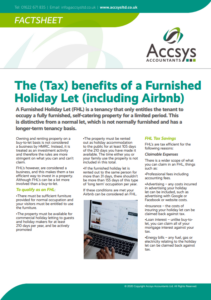The (Tax) benefits of a Furnished Holiday Let (including Airbnb)

A Furnished Holiday Let (FHL) is a tenancy that only entitles the tenant to occupy a fully furnished, self-catering property for a limited period. This is distinctive from a normal let, which is not normally furnished and has a longer-term tenancy basis.
Owning and renting property on a buy-to-let basis is not considered a business by HMRC. Instead, it is treated as an investment activity and therefore the rules are more stringent on what you can and can’t claim.
FHL’s however, are considered a business, and this makes them a tax efficient way to invest in a property. Although FHL’s can be a lot more involved than a buy-to-let.
To qualify as an FHL:
•There must be sufficient furniture provided for normal occupation and your visitors must be entitled to use the furniture.
•The property must be available for commercial holiday letting to guests and holiday makers for at least 210 days per year, and be actively promoted
•The property must be rented out as holiday accommodation to the public for at least 105 days of the 210 days you have made it available. The time either you or your family use the property is not included in this total.
•If the furnished holiday let is rented out to the same person for more than 31 days, there shouldn’t be more than 155 days of this type of ‘long term’ occupation per year.
If these conditions are met your Airbnb can be considered an FHL.
FHL Tax Savings
FHL’s are tax efficient for the following reasons:
Claimable Expenses
There is a wider scope of what you can claim in an FHL, things such as:
•Professional fees including accounting fees.
•Advertising – any costs incurred in advertising your holiday let can be included, such as advertising with Google or Facebook or website costs.
•Insurance – the costs of insuring your holiday let can be claimed back against tax.
•Loan interest – unlike buy-to-let, you can claim all of your mortgage interest against your tax.
•Energy bills – any fuel, gas or electricity relating to the holiday let can be claimed back against tax.
•Cleaning costs – most holiday let owners will not want the responsibility of having to clean and launder the holiday let at every changeover. These costs can all be set against the taxable income of the holiday lettings business.
•Subscription packages – if you are subscribing to any subscription service that includes Wi-Fi or TV services for your paying guests, then this is all a legitimate cost to your holiday let and can therefore be offset against your profits.
•Gardening
•Travel expenses – any travel expenses in connection with your FHL can be claimed at up to 45p a mile and can be included without a taxable benefit being incurred. You will need to keep a mileage log.
•Home office
•Capital Allowances on the cost of furnishings and fixtures can be claimed.
Capital Gains Tax
One of the biggest benefits of an FHL is Capital Gains Tax. There are reliefs available that are only normally reserved for trading businesses:
1.Business Asset Relief (F.K.A Entrepreneurs Relief) – pay CGT at 10%
2.Hold Over Relief – a relief for gifting FHL assets, for example to a younger generation.
3.Roll Over Relief – defer CGT when disposing of an FHL if you reinvest in qualifying assets.
Business Rates
As a business property your FHL must pay business rates, but many qualify for Small Business rate relief.
Pension contributions
Income generated from an FHL property is classed as ‘relevant earnings’ – this means you can make tax-advantaged pension contributions.
More income
The upside potential for an FHL or Airbnb is that you can potentially have higher revenue. On average, short-term rentals can generate more income than long-term rental, but where there is reward there is often risk. Long-term rentals offer more stability and less risk, but potentially lower rewards.
VAT
One possible downside of an FHL is that if your income is over £85,000 you will have to register and account for VAT.
Should I own my FHL in a company
The benefits of owning your FHL in a limited company are that any income will be taxed at the corporation tax rate, which is generally lower than income tax, but this advantage is eroded and can be lost once you draw the income.
The general advice is if you don’t need the income to live on then using a Limited Company wrapper for your FHL is best. But if you are drawing all the profit the FHL makes, then your tax position will be worse.
If you are planning on having multiple FHL’S the company route is one worth exploring.
How we can help
We can help by making sure your FHL is in the most tax efficient vehicle for your personal circumstances. We can help set up FHL companies and ensure that you are meeting all your statutory requirements. Contact us for more details.


